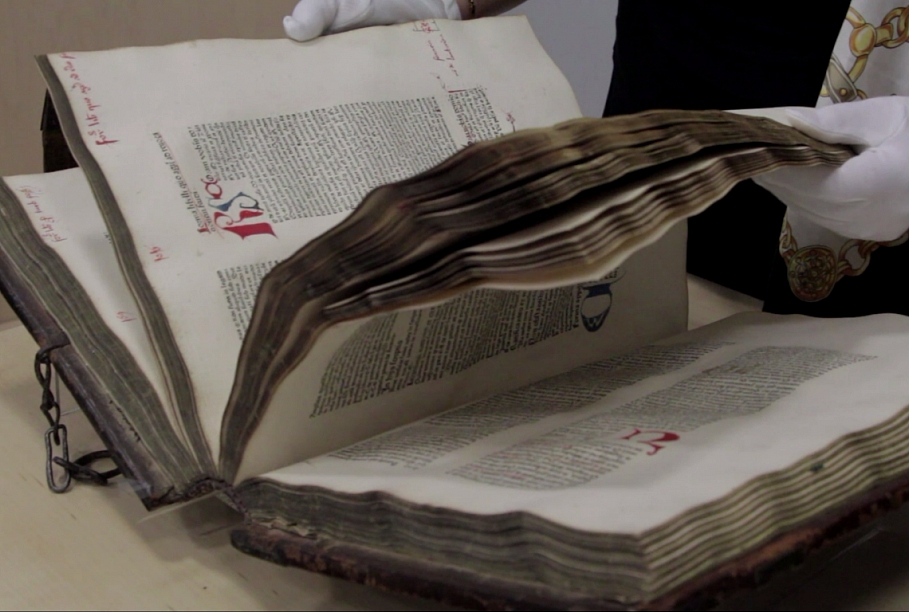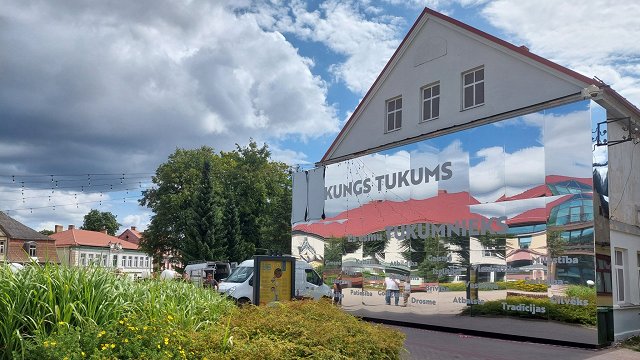This story is part of the Latvian Radio strand featuring six books that shaped Latvian letters throughout the centuries.
While the Code of Canon Law itself is part of a story that unfolded in the context of the history of Rīga, Livonia and Europe.
"I can quote Victor Hugo - it is a cathedral of memory and remembrance in a number of aspects," said Taimiņa.
The code (set of rules) aims to help in judicial practice. It was written by the Italian lawyer Giovanni Pietro Ferrari (1389?-1416). It was a work that was printed often following the invention of the printing press.
It was published at least 36 times across Europe from 1471 to 1499. The ubiquitous book nevertheless has been granted a special place in the upcoming. It has to do with its owner, who left enough traces about himself to leave the posterity with an impression of his time.
The book in the exhibition was once owned by Reinhold Soltrump, who in turn had what might have been the most beautiful library in Rīga.
The master of the book
Soltrump was by all means a well-to-do person - he was a patrician, the son of the city's chief magistrate (Burgermeister), and had the means necessary for a worldly education. In 1464 when he was 20 he embarked on a quest for knowledge and he went to study abroad.
Soltrump traveled far and wide. He studied at the Leipzig University and spent about ten years abroad. He returned to Rīga at about 1480 when he had a bachelor's and a master's degree in both civic and canon law. Upon his return, he became a cleric. Soltrump brought his books with him, including the large Code of Canon Law he had bought in Strasbourg.
It seems that he had owned 15 similar codes in what might have been Rīga's most beautiful library. The book was used for personal needs - for work and for education. The book is full of notes and marginalia, said Taimiņa.
History on the margins
The book bears witness to a conflict important in the history of the Latvian capital. It lasted for dozens of years, with Rīga Archbishop Silvester Stodewescher on the one side and Soltrump's father Johann Soltrump on the other.
In March 1477 Rīga declined to submit to the Archbishop, and chief magistrate Johann Soltrump was caught in the crossfire as he was the ostensible head of the opposition. He suddenly died in June, and he was seen off at the St. Peter's Church as the head of the city and a patrician. During the funeral procession on June 29, however, the Archbishop took the stage at the Dome Church and pronounced punishment over all the people who partook in the funeral. He asked them to repent, threatening them with excommunication. The Archbishop was widely ignored by the proud Rīgans however.
Soltrump used the book to analyze the situation. He wrote his father's initials - 'J.S.' - in pages dedicated to the father and his testament. He marked the part explaining what to do if the father has died without leaving a testament. The fact that, on the one hand, he was subjected to the Archbishop, and, on the other - to his father and the city - was reflected in the book's entry on properties.
"I'd like to think [the markings] mean that Soltrump thought of himself as the son of his father, not a cleric subjected to the Archbishop," said Taimiņa.
Soltrump is considered to be the first art collector in Rīga. The book even features metal engravings, which are a great rarity.
The volume has two engravings, one featuring the Holy Trinity and the other - St. Christopher.
Soltrump's traces in Rīga disappear after 1489 and the rest of his fates are unknown. His books went to the Rīga Franciscan Monastery.
The book will be on show at the National Library of Latvia exhibition "Book in Latvia", which will be opened August 29.



























